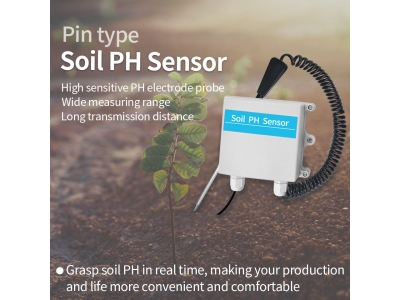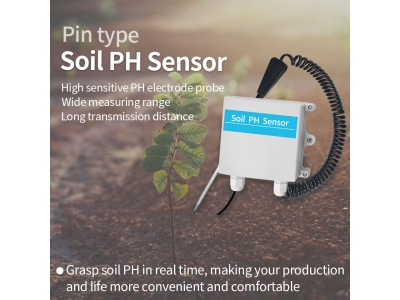Irrigation is a crucial aspect of agriculture, as it directly affects the growth and yield of crops. Traditional irrigation practices often involve applying water uniformly across a field, without considering the specific water needs of different areas within the field. This can lead to overwatering in some areas and underwatering in others, resulting in inefficient water usage and potential crop damage.
In recent years, there has been a growing interest in precision agriculture, which aims to optimize the use of resources in farming, including water. One of the key technologies that has revolutionized irrigation practices is the use of soil sensors for precision water management.

Soil sensors are devices that are installed in the ground to measure various soil parameters, such as moisture content, temperature, and salinity. These sensors provide real-time data on the soil conditions, allowing farmers to make informed decisions about when and how much to irrigate.
The use of soil sensors has several benefits for irrigation practices. Firstly, it allows for the customization of irrigation schedules based on the specific needs of the crops and the soil. By monitoring the soil moisture levels, farmers can avoid overwatering or underwatering, and ensure that the plants receive the right amount of water at the right time.
Secondly, soil sensors enable farmers to identify and address issues such as waterlogging or soil salinity, which can have negative impacts on crop growth. By detecting these problems early, farmers can take corrective measures to improve the soil conditions and optimize the growth of the crops.
Furthermore, soil sensors can help in the conservation of water resources. By using the data from the sensors to precisely control the irrigation, farmers can reduce water wastage and minimize the environmental impact of their farming practices.
The use of soil sensors for precision water management is not only beneficial for the farmers, but also for the environment. By optimizing water usage, farmers can contribute to the conservation of water resources and reduce the risk of water pollution from agricultural runoff.
In addition to the direct benefits for farmers and the environment, precision water management with soil sensors can also have economic advantages. By improving the efficiency of irrigation practices, farmers can potentially increase their crop yields and reduce their production costs. This can lead to higher profits and a more sustainable farming operation.
The adoption of soil sensors for precision water management is still relatively new, but it is rapidly gaining traction in the agriculture industry. Many farmers have already started to integrate soil sensors into their irrigation systems, and the results have been promising.
However, there are still some challenges and barriers to the widespread adoption of soil sensors for precision water management. One of the main challenges is the cost of the sensors and the associated technology. While the prices of soil sensors have been decreasing in recent years, they can still be a significant investment for small-scale farmers.
Another challenge is the need for technical expertise to install and maintain the soil sensors. Farmers may require training and support to effectively use the sensors and interpret the data they provide. Additionally, there is a need for user-friendly and affordable data management systems to help farmers make sense of the information collected by the sensors.
Despite these challenges, the potential benefits of precision water management with soil sensors are undeniable. As the technology continues to advance and become more accessible, it has the potential to revolutionize irrigation practices and improve the sustainability of agriculture.
In conclusion, soil sensors have the potential to revolutionize irrigation practices by enabling precision water management. By providing real-time data on soil conditions, these sensors allow farmers to customize their irrigation schedules, conserve water resources, and optimize the growth of their crops. While there are challenges to the widespread adoption of soil sensors, the potential benefits for farmers, the environment, and the economy make it a technology worth investing in. As the agriculture industry continues to embrace precision agriculture, soil sensors are likely to play a crucial role in the future of irrigation practices.






